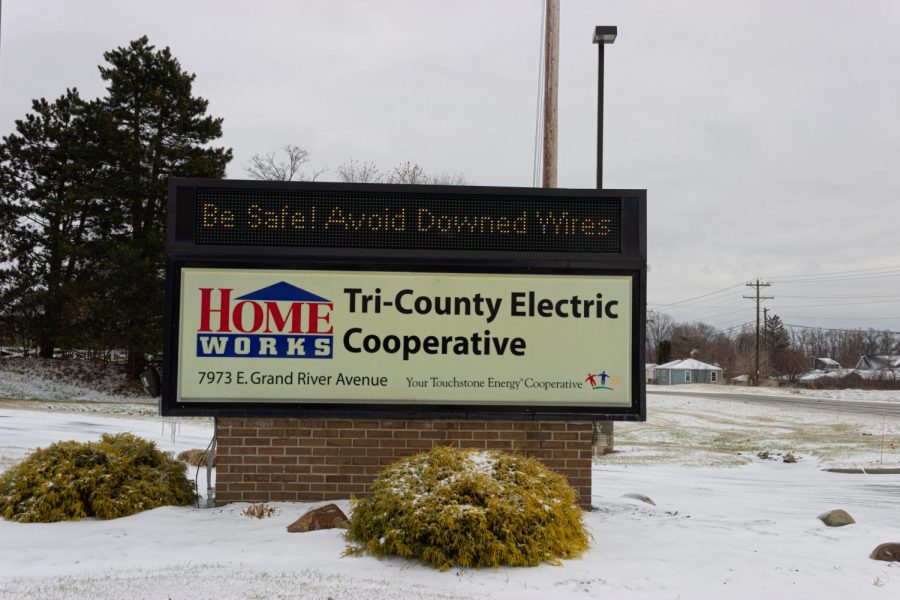Where Does Your Energy Come From?
Homeworks Tri-County Electric works to provide electricity even through inclement weather.
January 9, 2020
Televisions, laptops, phones, lights, washing machines, microwaves, fans, heaters and stoves– every household appliance that needs to plug into an outlet takes energy but, in the age of technology, more and more are being integrated into everyday life and using more and more energy. The average home in Michigan consumes about 665 kilowatt hours (kwh) per month (25.14% less than the American average and less than 40 other US states) but spends 18.94% more money per kwh than the average American home for a total cost of about 95 dollars per month. This energy used in every home has to come from somewhere, so where does Michigan get its electricity?
There are multiple different types of energy sources native to Michigan, this includes but is not limited to sources like natural gas, ethanol, nuclear power, hydroelectric power, wind power, solar power, and biomass. Michigan power companies use a combination of all of these to generate electricity to power most every home in the state. Utility companies, including power, are natural monopolies, meaning that they are the only company to provide power in a certain area, and are regulated by the government. So which companies provide this utility to the residents of Grand Ledge? Consumers Energy, the Lansing Board of Water and Light, and Homeworks Tri-County Cooperative all supply the residents of Grand Ledge and its suburbs with their power.
Not all energy is created equally, as some of that energy can have very adverse consequences on the environment and the ecosystem around it. Utility companies are aware of this, and because of both public influence and the threat of climate change, many have introduced plans to increase their usage and production of green energy. Consumers Energy has instituted the Clean Energy Plan that plans to end coal use, decrease carbon emissions by 90 percent from 2009, and meet their customers’ electricity needs using 90 percent clean energy sources by 2040. They also offer programs to decrease both energy use and use more green energy both at home and at businesses. The Lansing Board of Water and Light provides opportunities to install solar panels, recycle old appliances, and purchase “GreenWise” energy in addition to normal electricity costs to power a home solely off of clean renewable energy. Homeworks Tri-County energy production already comes from over 20 percent clean and renewable sources, but they also provide easy and beneficial programs to increase each home and business owner’s green footprint, such as the Community Solar program where a homeowner purchases solar energy from Spartan Solar, Distributed Renewable Energy program where Homeworks buys back all unused energy from home-installed solar panels, and a Buy All/Sell All program where Homeworks buys all energy produced from home-installed solar panels, providing a way to add green energy to the co-op and make money for the electric bill. Homeworks has other energy optimization programs that reduce energy use and produce more clean energy, but neither Homeworks nor the Lansing Board of Water and Light have a clear or upfront plan to increase green energy usage or decrease carbon emissions.
All of these power companies want every home and business owner to decrease their power consumption in order to reduce the environmental impact and to reduce the number of new power plants that will need to be built for increasing energy demand, and to reduce energy rates. Their tips include using energy star appliances, use LED bulbs and reduce lighting usage when not necessary, and install aerating, low-flow faucets and shower heads to reduce water usage. More efficient appliances/use of appliances as well as being aware of ways to easily and efficiently reduce energy are some of the best ways to help the environment, as with a lower energy usage comes less coal, fossil fuels, or oil being used, as well as less power plants being built. Consumers and utility companies must work together to do what they can and increase their green footprint. Utilize the websites for Consumers, Homeworks Tri-County, and The Lansing Board of Water and Light for more information on how to reduce energy consumption and ways to add to the clean renewable energy cycle.










